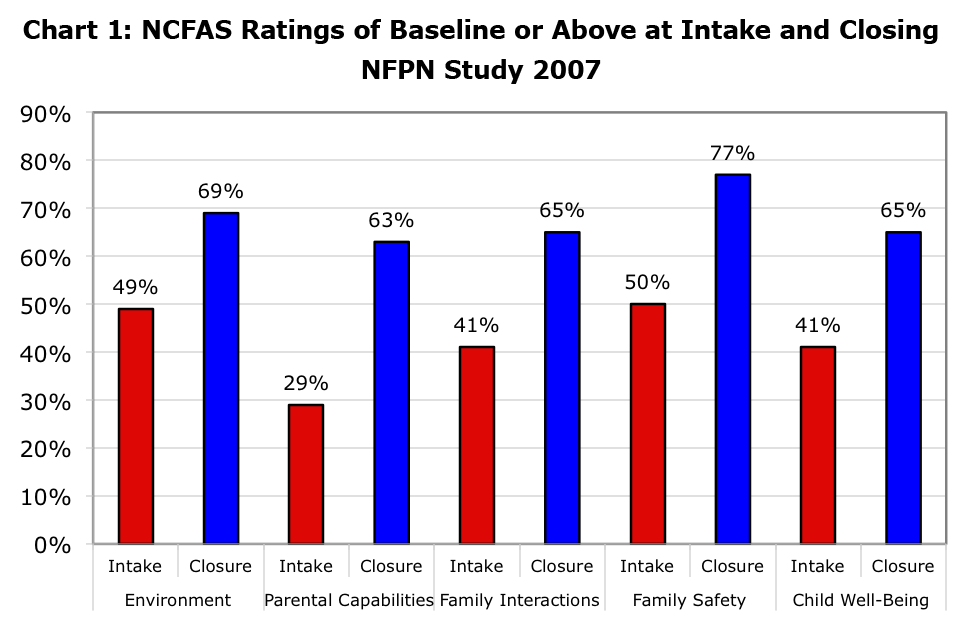 In this post we look at the target populations with which IFPS has been found to be effective and an assessment tool for use with IFPS.
In this post we look at the target populations with which IFPS has been found to be effective and an assessment tool for use with IFPS.
IFPS is Effective with High-Risk Families
Dr. Ray Kirk from the University of North Carolina-Chapel Hill conducted a retrospective study (NC DSS, 2001) of more than 1,200 children who had received IFPS services in North Carolina and compared them with over 110,000 children who had not received these services.
IFPS outperformed traditional child welfare services in every case by reducing the number of placements or delaying placements. IFPS interventions improved family functioning and were most effective with the highest risk families.
IFPS Reduces Disproportionality
In this study, high-risk minority children receiving traditional services were at higher risk of placement than white children, but minority children receiving IFPS were less likely to be placed than white children.
Note: a future blog post will provide details of this study.
IFPS is Effective with Older Youth
A study showed that IFPS services resulted in a 92% placement prevention rate for older youth (ages 12-17) in comparison to an 88% placement prevention rate for younger children (ages 0-11). For more details of this study, visit:
http://ifpscoasttocoast.wordpress.com/2013/10/23/ifps-is-effective-with-older-youth/
IFPS is Effective with Juvenile Offenders
HOMEBUILDERS® received funding from the U.S. Administration for Children, Youth and Families to provide services to youth and families referred from the Pierce County Juvenile Court.
Twelve months after intake, 73% of youth served were not placed in out-of home care. Data from the overflow comparison group showed that only 28% of the comparison youth avoided placement. For the full report, visit:
http://ifpscoasttocoast.wordpress.com/2013/11/13/ifps-with-juvenile-justice/
IFPS is Effective with Children with Mental Health Challenges
HOMEBUILDERS® was originally developed to prevent the psychiatric hospitalization of severely behaviorally disturbed children. From January 2009 through April 2013 the program served 3014 children at risk of placement, 383 of whom were reported to have serious mental health symptoms.
In the entire population, 97.5% of children successfully avoided placement at termination of services. Ninety-six percent of the 383 youth with serious mental health issues avoided out of home placement at termination of services. For additional studies involving IFPS and mental health visit:
http://ifpscoasttocoast.wordpress.com/category/mental-health/
IFPS is Effective with Adoptive Families
Dr. Marianne Berry and NFPN conducted a study on the use of IFPS with post-adoptive families in Missouri. 83% of the adoptive families studied were preserved by the end of IFPS. At a six-month follow-up point, 76% remained intact. No families contacted at the six or 12-month follow-up checks had legally disrupted. To view the complete report, visit:
http://nfpn.org/articles/ifps-with-post-adoptive-families
IFPS is Effective with Reunifying Families
The earliest study of the use of IFPS with reunifying families was conducted in Utah in 1995.
The IFPS intervention lasted 90 days and children were returned to the families within 15 days of referral. Following IFPS services, 92% of the children were at home vs. 28% of the control group. For additional information, view the IFPS ToolKit (chapters 10 and 11) here:
http://www.nfpn.org/preservation/ifps-toolkit
Assessment Tool Created for Use with IFPS
Development of the North Carolina Family Assessment Scale (NCFAS) for use with IFPS services provided an opportunity to measure a family’s progress following an IFPS intervention. The family’s progress is also closely tied to successfully remaining intact. Here’s a chart with typical pre/post ratings from research on use of the NCFAS with IFPS families (the percentages refer to the families that are at baseline or above, meaning that no intervention is required in that domain):

The NCFAS tools continue to demonstrate strong reliability and validity with IFPS programs. For a more detailed report, visit:
http://www.nfpn.org/assessment-tools/ncfases-scale-development-report
_______________
Posted by Charlotte Booth, Executive Director, Institute for Family Development
and Priscilla Martens, Executive Director, National Family Preservation Network
